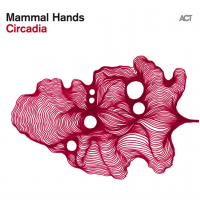Home » Jazz Articles » Album Review » Theo Travis: Double Talk
Theo Travis: Double Talk
The sum total of many diverse parts, Double Talk remains a focused work that largely features Travis' quartet with the increasingly ubiquitous (and impressive) guitarist Mike Outram, Hammond organist Pete Whittaker and drummer Roy Dodds. Travis plays a variety of woodwinds, concentrating on saxophones, clarinets and flutes this time around. Using his Travis System of Ambitronics, he's able to increase the sonic potential of his instruments, owing a significant debt to King Crimson guitarist Robert Fripp, whose own Frippertronics and more recent guitar soundscapes have expanded one instrument into an entire orchestra. It's fitting, then, that Fripp himself should guest on three tracks—the extended and episodic "Oblivionville," the ambient-textured "The Endless Search" and "Pallendream," where abstract ambience and pulse, at times, intersect.
While earlier albums have alluded to Travis' broad musical concerns, Double Talk is his most integrated to date. The sixteen-minute "Oblivionville" opens with ethereal layers of flute loops and Fripp's soundscapes, leading into a definitively swinging and undeniably jazzy section for Travis' quartet, where his warm tenor navigates its deeper changes with ease. Outram's spare, clean-toned but heavily- reverbed guitar solo adds a blues tinge, with Travis joining him for an in-tandem head that dissolves back into ambient territory, this time with Travis' clarinets creating a slightly more grounded atmospheric. Leading into an urgent section reminiscent of early-1970s Crimson (though not as harsh), "Oblivionville" finally returns to its swinging theme to close.
"The Relegation of Pluto" also references early Crimson with its riff-based head, but opens up to greater freedom for a solo from Whittaker that's egged on by Outram's jaggedly dissonant swells, moving ever-forward with Dodds' persistent but elastic pulse. Travis' solo combines outside phrases with his ambitronics before dissolving into even more abstruse free play.
Travis also combines his improvisational mindset with pre-prog psychedelia on a clever version of Pink Floyd's early hit, "See Emily Play," his ambitronics and wah wah sax adding the necessary space rock vibe. The album ends with the blues-based "Portobello 67," which manages to evoke 1960s pop while, at the same time, injecting a tinge of the jazz vernacular.
It may not be an album for purists, but for those whose tastes run the gamut from pop and rock to prog, ambient and, of course, jazz, Double Talk is an album that pays big dividends for an artist (and group) that deserves to emerge from hidden treasure status.
Track Listing
Ascending; Oblivionville (incorporating "The Last Day," "Open Earth" and "A Return"; The Relegation of Pluto; The Endless Search; Pallendream; See Emily Play; And So It Seemed; Portobello 67.
Personnel
Theo Travis
saxophoneTheo Travis: soprano saxophone (1, 5, 6), tenor saxophone (2, 3, 7, 8), flute loops (2), clarinets (2), alto flutes (4), wah wah saxophone (5, 6); Pete Whittaker: Hammond organ (1-3, 5-8); Mike Outram: electric guitar (1-3, 6-8); Roy Dodds: drums(1-3, 5-8); Robert Fripp: electric guitar (4, 5), guitar soundscapes (2, 4).
Album information
Title: Double Talk | Year Released: 2007 | Record Label: Unknown label
Tags
PREVIOUS / NEXT
Support All About Jazz
 All About Jazz has been a pillar of jazz since 1995, championing it as an art form and, more importantly, supporting the musicians who make it. Our enduring commitment has made "AAJ" one of the most culturally important websites of its kind, read by hundreds of thousands of fans, musicians and industry figures every month.
All About Jazz has been a pillar of jazz since 1995, championing it as an art form and, more importantly, supporting the musicians who make it. Our enduring commitment has made "AAJ" one of the most culturally important websites of its kind, read by hundreds of thousands of fans, musicians and industry figures every month.





















